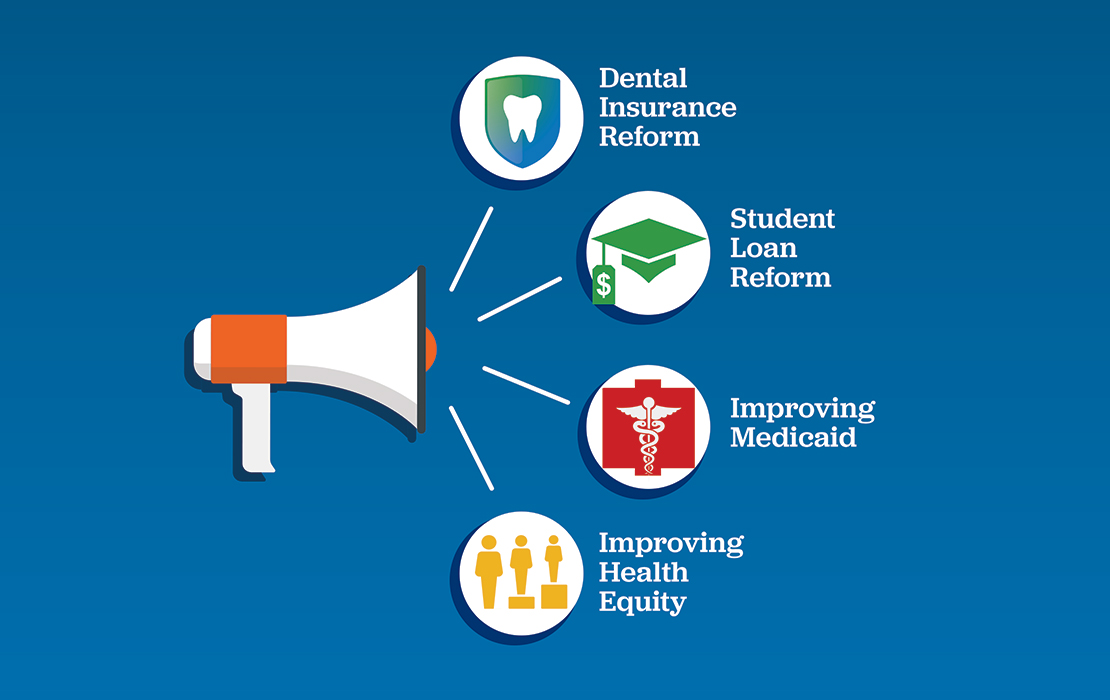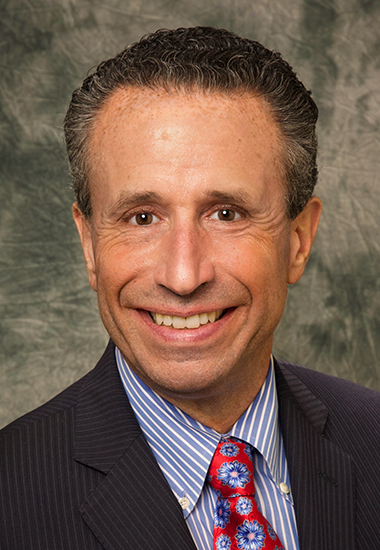ADA prioritizes 2022 advocacy issues
ADA prioritizes 2022 advocacy issues



Dental insurance and student debt reform. Improving Medicaid. Health equity.
Every year the ADA prioritizes the issues the Association believes have the most impact on dentists, the dental profession and public. These issues are one of the main focuses of Lobby Day, which every year brings dentists and dental students together to advocate on behalf of the profession. But they are also issues the ADA advocates for every day.
“Through advocacy efforts, the ADA fulfills our mission to help dentists succeed and support the advancement of public health,” said ADA President Cesar R. Sabates, D.D.S. “Each year, the ADA's advocacy has an impact on more than 25,000 dental students and more than 200,000 of our dentist colleagues. Perhaps most importantly, it also affects millions of patients. The message is clear: It is powerful when dentists unite."
Below are some of the top issues the ADA is advocating for in 2022.
Dental insurance reform
Dental insurance issues are regularly rated among the most important concerns confronting dentists. On the national front and together with state dental societies, the ADA is working to achieve key legislative policy reforms.
One bill the ADA is advocating for on this is the Dental and Optometric Care Access Act, or DOC Access Act. This bipartisan legislation prohibits dental and vision plans from setting the fees network doctors may charge for services not covered by the insurers. It also protects patients and brings needed equity to insurer/provider contracting.
"We are supporting this bill because the ADA believes that patients are adversely affected by provisions in dental insurance plans that dictate what a doctor may charge for services not covered by the patient's insurance plan," said Mark Vitale, D.M.D., chair, ADA Council on Government Affairs.
"DOC Access will provide greater access to high-quality care by helping to curb anti-patient and anti-competitive practices of dental insurance plans," Dr. Vitale continued. "Even though 42 states have passed laws limiting interference with the dentist-patient relationship, many dental and vision plans are federally regulated so insurers can claim they are exempt. Passage of this bill will help align the federal government with what's happening across the country, and it would also bring needed balance to contract negotiations between providers and large dental insurance companies."
Another bill, the Ensuring Lasting Smiles Act, would make it easier for patients with congenital anomalies or birth defects to receive the dental care and other treatments they need by requiring all private group and individual health plans to cover medically necessary services for those conditions.
"This is an important issue because many craniofacial anomalies can restrict a patient's ability to breathe, eat and speak in a normal manner," Dr. Vitale said. "And while many private health insurance companies cover preliminary procedures, they often routinely deny or delay follow-up or corrective procedures claiming that these procedures are cosmetic in nature. This fails to recognize the medical conditions of these patients."
"Early intervention by a team of specialists, including plastic surgeons, oral and maxillofacial surgeons, pediatric dentists, orthodontists, dermatologists and speech therapists is necessary to assess and oversee the patient's treatment and development, sometimes over the course of several years."
Improving Medicaid
The COVID-19 pandemic spotlighted the inadequacies within the nation's social safety net programs, especially in oral health care.
The Medicaid Dental Benefits Act would make comprehensive dental care a mandatory component of Medicaid coverage for adults in every state.
"Many adults who rely on Medicaid benefits find that there is little, if any, coverage for dental care due to a long-standing lack of focus on adult oral health care from federal and state governments," said Shailee Gupta, D.D.S., chair of the ADA Council on Advocacy for Access and Prevention. "This has created a patchwork of dental coverage by state Medicaid programs. Without a federal requirement, and given the competing priorities for state budgets, the optional adult dental benefit is often not provided by states."
Student loan reform
The ADA is passionate about alleviating the alarming levels of educational debt that new dentists face after graduating from dental school.
This includes reforming parts of the Higher Education Act of 1965, which provides the statutory authority for most federal student loan programs, including those most widely used by dental students.
One of the bills the ADA is advocating for is the Resident Education Deferred Interest Act, which would amend the Higher Education Act to allow borrowers to defer their student loans interest-free while they are serving a medical or dental internship or residency program. Currently, dental and medical residents accrue interest on their graduate loans while they are in school and residency - even if they qualify for deferment or forbearance due to their inability to make payments.
The ADA is also advocating for the Student Loan Refinancing Act, which would provide multiple opportunities for borrowers to refinance federal Direct Loans, Direct PLUS Loans and Direct Consolidation Loans when interest rates are lower. It would also ensure the refinanced rates are fixed to protect borrowers from interest rate hikes.
Health equity
The COVID-19 pandemic also underscored inequalities in the nation's health care system.
The ADA is on the record supporting several bills in the current Congress that address health equity issues, including the Improving Social Determinants of Health Act. If enacted, this bill would require the Centers for Disease Control and Prevention to establish a program to improve health outcomes and reduce health inequities by coordinating activities across the CDC.
Other bills focusing on health equity include:
- The Health Enterprise Zones Act, which calls for the designation of Health Enterprise Zones in certain geographic areas with documented and measurable health disparities. The designation confers eligibility for certain grants, student loan repayment programs, and tax credits for those working to reduce health disparities and improve health outcomes in these zones.
- The Oral Health Literacy and Awareness Act, which amends the Public Health Service Act to authorize a public education campaign across all relevant programs of the Health Resources and Services Administration to increase oral health literacy and awareness.
- The Doctors of Community Act, which would permanently authorize the Teaching Health Center Graduate Medical Education program to support the training of primary care medical and dental residents in high-need communities.
- The Indian Health Service Health Professions Tax Fairness Act, which would amend the tax code to provide health care professionals, such as dentists, who receive student loan repayments and scholarships from the Indian Health Service the same tax-free status enjoyed by those who receive National Health Service Corps and Army loan repayments.
Every day, decisions are made in Washington that can affect dentists, dental students, patients and the future of dental care in the United States. Want to make sure your voice is heard? Sign up for the ADA's Legislative Action Center today.
For more information about all of the ADA's advocacy issues, visit ADA.org/Advocacy .



